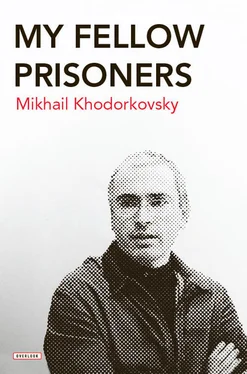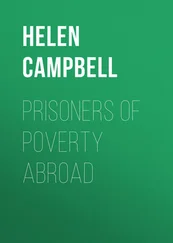Soon after that he was transferred, but we heard on the prison grapevine that his sentence remained unchanged.
So when you’re next watching television and hear the words ‘criminal proceedings have been initiated’ or ‘the investigation has established’, before you allow yourself even for a second to believe what’s being said, just think: maybe the person who has written these words is a colleague of my cellmate, the con-man.
At any rate, in the regular announcements of the Investigative Committee’s press secretary, I hear his voice loud and clear.
I’m writing these notes because I want people who care about these things to know what I have personally experienced in prison.
Over time I’ve turned from an ordinary victim into an interested observer, and I’ve discovered that for many people the prison world remains terra incognita . And yet in our country one in every hundred people is currently in prison; one in ten (maybe by now one in seven) of the male population passes through prison at some point in their lives.
Moreover, prison has a terrible effect on the majority of both prisoners and guards. It’s not yet clear, in fact, which group is affected more.
Society has to do something about this human tragedy. And for a start people need to know about it.
This story is about the guards.
The people who feel most uninhibited in prison are the police investigators, known in the vernacular as the ‘operatives’. Their official duty is to prevent crimes that someone might be thinking of committing, and to uncover those that have already been committed. As a result they’re not much constrained by prison regulations. Facial rearrangements and endless interrogations, mobile phones and drugs – these form just a small part of their standard arsenal.
The operatives usually know how to work with people and are good at it. They know how to talk, how to listen. But there are exceptions.
Take the head of the police investigation unit, a 27-year-old called Pelshe, whose first name and patronymic are so hard to pronounce that by common agreement he’s long been known simply as Sergei Sergeyevich. He’s not a man for small talk. He fixes his transparent, ice-cold eyes right into yours and lurches about desperately, caught in a verbal trap of harrumphing and interjections. When he’s sober, that is.
In fact, he’s rarely sober. When you see those slightly protruding ears glowing red like traffic-lights and catch that faint whiff, you know he’s in a good mood and his speech will flow smoothly. But at the same time it’s a signal to the unwary: ‘Keep your mouth shut.’ Alcohol has no effect on the professional operative’s memory.
However, Sergei Sergeyevich is just as likely to treat the most taciturn prisoner to a dose of his none-too-gentle fists. He hits people like a true professional, leaving minimum trace, though the recipient spends a week groaning and pissing blood. But no one reckons this ‘talking to’ is particularly bad. The general opinion is that he’s not an animal; ‘freelance operatives’ are far rougher.
As well as applying his fists, Sergei Sergeyevich can also treat you to tea and sweets, and give you cigarettes; he’ll even let you make a call on his mobile. Though you can be sure he’ll make a note of the number.
Sergei Sergeyevich regards the visits of ad-hoc commissions as an unavoidable evil, and his attitude is no different from that of the other inhabitants of the prison colony. In order to feed these numerous commissions, Sergei Sergeyevich generally collects funds from the staff. But if it’s getting close to pay-day, then he might look for additional ‘support’ from the prisoners themselves.
The detainees take an understanding approach to the problem and chip in. Sometimes, instead, they ask him to ‘sell’ back something previously taken from them, like their telephone or another forbidden item. And then the ‘high contracting parties’ reach a consensus, and a deal is struck.
Sergei Sergeyevich lies to the court and commissions without a second thought.
‘Sergei Sergeyevich, who wrote this two-page explanation?’ the judge asks.
‘The convict Badayev, in his own hand,’ replies Pelshe firmly. ‘As is written.’
‘But Badayev is illiterate; it says so in his personal case file. He only had two years of school!’
Sergei Sergeyevich says nothing, the traffic-lights glow red… You might think he’s feeling embarrassed, but we all know the real reason. And Sergei Sergeyevich is lost in his own thoughts. He doesn’t give a stuff about the court. The convict Badayev does give a stuff, but nobody else gives a stuff about Badayev.
In the difficult years of reforms, representatives of the criminal world (so-called ‘overseers’) kept the prisoners fed and prevented needless conflicts between them, while also embedding a criminal ideology. Now Sergei Sergeyevich and his colleagues do the same thing, effectively training up the future foot-soldiers of the criminal world.
‘You’re not a person, and those around you aren’t people!’; ‘You should just listen to your superiors and not think when following an order!’; ‘The less you think, the better your life!’
These are the maxims that are hammered into the heads of 18- to 25-year-old detainees, and as a result the percentage that ends up back in jail is astronomical. Those who manage to stay out of prison do so in spite of it, not thanks to it.
In fact, this is why nobody is particularly surprised when a slightly more inebriated than usual Sergei Sergeyevich yells at the top of his voice at roll call: ‘Who’s the overseer here?! I’m the overseer!!!’
Indeed he is.
‘Sergei Sergeyevich,’ I ask him, ‘if you and your colleagues were to change places with the prisoners currently in here, no one would notice much of a difference, would they?’
‘They wouldn’t,’ he agrees, and seems not the least bit aggrieved by this state of affairs. He’s the same as everybody else.
Sometimes, what takes place in prison seems like a version of ordinary life beyond the prison gates, just taken to a grotesque extreme. Nowadays in ‘ordinary’ life, too, it can be difficult to distinguish a racketeer from an employee of an official organization. In fact, does this distinction even exist for most people?
And what happens to those of us who are too frightened to stand up for our rights, who adapt and hide behind a mask of submissiveness? Does this protective mask not morph to become our real face? Do we not gradually turn into slaves, silent and unresponsive, but prepared to commit any abomination if so ordered from on high?
When I was leaving the colony, it was Sergei Sergeyevich who carried my things to the car.
‘Please don’t come back to our colony,’ he said. ‘It’s more peaceful without you.’
Four years later the colony was burned to the ground, set alight by those same silent prisoners.
Guilty without Guilt: Volodya
It looks very likely that over the next few years we will find ourselves living in a bureaucratic-police state, with absolute power in the hands of a corrupt bureaucracy. A bureaucracy that’s indifferent to our fate and utterly brazen. Here I want to tell the story of two people who have ended up in its clutches.
The cell door opens with its usual clank and standing on the threshold is a rather short, plump man with surprisingly long, slightly curly hair.
‘Hello everyone,’ he says and, limping heavily, makes his way over to a free bunk.
The young guy occupying the lower bunk sighs deeply, and gets up to switch places.
‘It’s okay, don’t worry,’ the small man says, clambering up using his stiff leg and unpacking his things like someone who’s done this many times before.
Читать дальше












